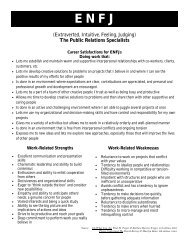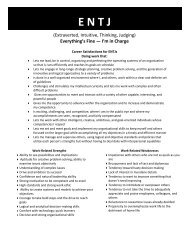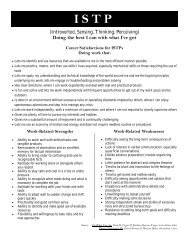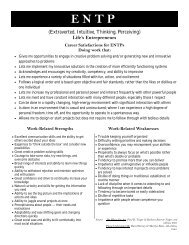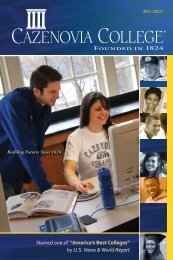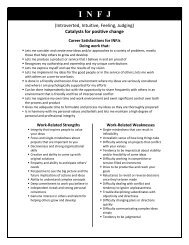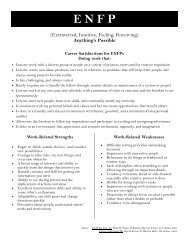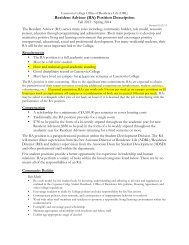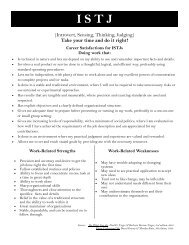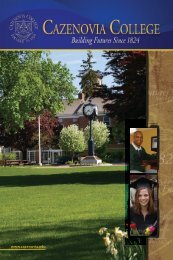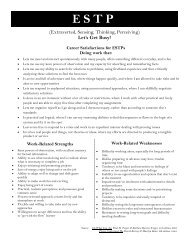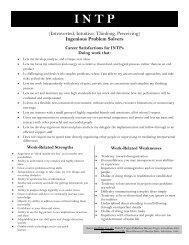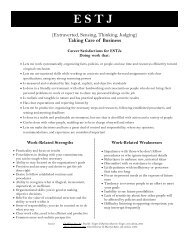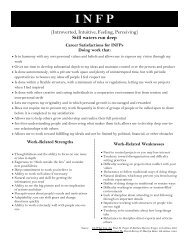of
2013-14 Academic Catalog - Cazenovia College
2013-14 Academic Catalog - Cazenovia College
- No tags were found...
You also want an ePaper? Increase the reach of your titles
YUMPU automatically turns print PDFs into web optimized ePapers that Google loves.
plans for teaching children in inclusive intermediate<br />
classrooms, grades 4-6. The new Core Curriculum and<br />
Learning Standards, developed by the New York State<br />
Department <strong>of</strong> Education, and the content area standards <strong>of</strong><br />
various pr<strong>of</strong>essional organizations will be incorporated into<br />
integrated thematic units. These materials will be<br />
supplemented with appropriate texts and other resource<br />
materials. Students will learn how to accommodate diverse<br />
learners, utilize child-centered instructional methods,<br />
promote technological and content area literacy, assess<br />
student performance, and establish a learning environment<br />
that supports inquiry.<br />
Field Component: In preparation for Student Teaching,<br />
students will be required to do extensive fieldwork in an<br />
inclusive classroom at the 4 th -6 th grade level Tuesdays and<br />
Thursdays, when there are no class sessions. This is the<br />
practicum part <strong>of</strong> the field work <strong>of</strong> the pr<strong>of</strong>essional semester.<br />
Students will actively participate in all aspects <strong>of</strong> the<br />
classroom to which they are assigned, and will directly assist<br />
the classroom teacher(s) in designing, planning,<br />
implementing, and evaluating curriculum and assessing<br />
student learning. Students will gradually assume<br />
responsibility for the tasks involved in teaching and learning<br />
as well as managing a productive classroom. Prerequisites:<br />
ED 111, ED 131, ED 217, ED 320. Co-requisites: ED 371,<br />
ED 450, ED 488. (Offered fall term)<br />
ED 450 Strategies for Teaching Students with Severe<br />
and/or Multiple Disabilities<br />
3 credits (CS)<br />
This course prepares students with knowledge,<br />
understanding, and skills to work effectively with children<br />
who have severe and/or multiple disabilities, including autism<br />
and emotional disorders. Students will learn the many<br />
characteristics <strong>of</strong> learners with these disabilities in order to<br />
develop strategies for curriculum modifications and effective<br />
instruction in the elementary and adolescent content areas.<br />
Students will also learn strategies to support literacy<br />
development and communication through assistive<br />
technology and environmental and programmatic<br />
adaptations, including a focus on transitions for all students<br />
with disabilities, from elementary to middle and high schools<br />
and from school to community settings. Prerequisites: ED<br />
111, ED 131, ED 217, ED 320. Co-requisites: ED 371, ED<br />
411/412, ED 484/488. (Offered fall term)<br />
school classroom (after the first 7 weeks <strong>of</strong> classes for the<br />
semester) engaged in supervised student teaching. Students<br />
will spend approximately 40 hours weekly on site, which<br />
includes a weekly seminar to support continued growth in<br />
effectively teaching to the New York State Student Learning<br />
Standards. Prerequisites: ED 111, ED 131, ED 217, ED 320.<br />
Co-requisites: ED 371, ED 411/412, ED 450. (Offered fall<br />
term)<br />
ED 488 Student Teaching: Intermediate Level<br />
6 credits (CS)<br />
Student teaching in the Inclusive Elementary Education<br />
Program is designed to provide candidates with opportunities<br />
to apply their knowledge, understanding, and skills in a way<br />
that has a positive impact on student learning. The student<br />
teaching component <strong>of</strong> the program provides the candidate<br />
with an increased responsibility for curriculum development<br />
and implementation, assessment <strong>of</strong> student learning,<br />
classroom management, collaboration with other<br />
pr<strong>of</strong>essionals, work with parents, and all aspects <strong>of</strong> the<br />
classroom routine. Students will spend a total <strong>of</strong> 7 weeks full<br />
time in an inclusive kindergarten or intermediate public<br />
school classroom (after the first 7 weeks <strong>of</strong> classes for the<br />
semester) engaged in supervised student teaching. Students<br />
will spend approximately 40 hours weekly on site, which<br />
includes a weekly seminar to support continued growth in<br />
effectively teaching to the New York State Student Learning<br />
Standards. Prerequisites: ED 111, ED 131, ED 217, ED 320.<br />
Co-requisites: ED 371, ED 411/412, ED 450. (Offered fall<br />
term)<br />
ED 495 The Reflective Practitioner (Capstone)<br />
3 credits (CS)<br />
This course will explore a framework <strong>of</strong> reflective teaching<br />
that is rooted in inquiry and self-study. Participants will<br />
become active students <strong>of</strong> their own questions and <strong>of</strong><br />
teaching, as they engage in a process <strong>of</strong> constructing the<br />
pr<strong>of</strong>essional values linked closely with sound reflective<br />
practice and to develop their pr<strong>of</strong>essional voice through<br />
writing, inquiry, and presentation. Through the use <strong>of</strong> mixed<br />
methods <strong>of</strong> data collection, management, analysis and<br />
personal narratives, students will examine reflective practice<br />
as it relates to problem-solving, curricular decision-making,<br />
nurturing the classroom community, and striving for<br />
pr<strong>of</strong>essional excellence in diverse and inclusive educational<br />
settings.<br />
ED 484 Student Teaching: Pre-Kindergarten or<br />
Prerequisites: Successful completion <strong>of</strong> all pr<strong>of</strong>essional<br />
Kindergarten<br />
courses in the Inclusive Early Childhood Education or<br />
6 credits (CS)<br />
Inclusive Elementary Education program options, including<br />
Student teaching in the Inclusive Early Childhood Education student teaching.<br />
Program is designed to provide candidates with opportunities<br />
to apply their knowledge, understanding, and skills in a way<br />
that has a positive impact on student learning. The student<br />
teaching component <strong>of</strong> the program provides the candidate English<br />
with an increased responsibility for curriculum development<br />
and implementation, assessment <strong>of</strong> student learning,<br />
EN 099 Foundations <strong>of</strong> Writing<br />
classroom management, collaboration with other<br />
3 non-degree credits<br />
pr<strong>of</strong>essionals, work with parents, and all aspects <strong>of</strong> the<br />
Students will produce paragraph and short essay pieces while<br />
classroom routine. Students will spend a total <strong>of</strong> 7 weeks full practicing grammar and technical control skills. This course<br />
time in an inclusive kindergarten or 1 st -2 nd grade public<br />
prepares students for EN 100 Fundamentals <strong>of</strong> College<br />
Academic Catalog | Cazenovia College | www.cazenovia.edu 150



